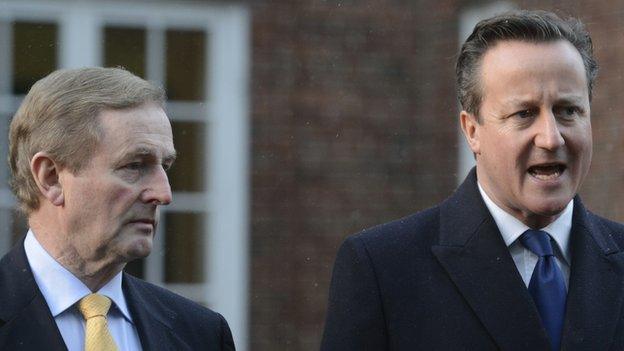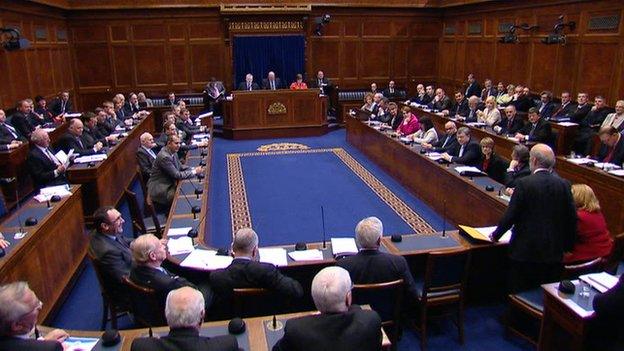Future Northern Ireland Assembly changes outlined by governments
- Published
- comments

The proposals were in a paper given to the parties by the two governments
Stormont would put arrangements in place for an opposition as early as March 2015, according to the government paper circulated to the parties at Stormont House last week.
The paper proposes that parties "which would be entitled to ministerial positions in the executive, but choose not to take them up" should be "recognised as an official opposition".
Parties who choose to go into opposition would receive financial and research assistance taken from within the existing assembly budget in order to keep the changes cost-neutral.
The new opposition would also get "designated speaking rights including the opportunity to ask questions and table business" in the assembly chamber.
The move towards an opposition is one of a number of institutional changes suggested in the Heads of Agreement paper circulated by the UK and Irish governments the night before prime ministers David Cameron and Enda Kenny left the Stormont House summit.
The proposals can be seen as an attempt to address the structural problems which First Minister Peter Robinson claimed in September had rendered Stormont "not fit for purpose".
The paper also suggested the number of Stormont departments should be reduced from 12 to nine, and that this cut should be made in time for the next scheduled assembly election in 2016.
The document didn't specify which departments might be abolished, but proposed that the local parties should agree a new allocation of departmental functions before the end of this year.
The paper envisages Social Development Minister Mervyn Storey bringing the controversial Welfare Reform Bill to the assembly chamber in January next year.
As things stand, with both Sinn Féin and the SDLP opposed to the welfare changes, nationalists could veto the move by tabling a "petition of concern" requiring a cross-community majority vote.
The Heads of Agreement paper retains the mechanism for 30 MLAs to trigger a "petition of concern". However, given criticism that such petitions have been used so frequently on partisan matters, it suggests a number of restrictions.
These are that a petition can only be tabled in "specified circumstances, such as legislation or where one part of the community would be directly and adversely affected by what is proposed".
The initiator of a "petition of concern" must also specify a reason for tabling it and provide "evidence of the anticipated negative impact on the section of the community concerned".
The paper envisages a seven to 14 day period during which a new Stormont coalition would be able to agree a programme of government and changes intended to make the executive function more smoothly.

The paper proposes cutting the reducing the number of MLAs
It suggests a "new process" designed to introduce "a more transparent and robust system for members' salaries and expenses".
On the size of the assembly, the Heads Of Agreement paper says the number of MLAs "should be reduced to five members per constituency in time for the 2021 Assembly election".
This move would cut the total number of MLAs from 108 to 90. The date 2016 is also in the document, but this has been scored out in favour of the later election.
It is unclear how much cross party agreement there is for reducing the size of the assembly and the number of Stormont departments.
The DUP is on record as favouring an assembly of between 70 and 80 MLAs.
In September, Deputy First Minister Martin McGuinness backed cutting the number of MLAs per constituency from six to five.
But when the BBC last month obtained a previous NIO paper which argued there was a "growing consensus" on these matters, Sinn Féin criticised it as "a piece of pro-unionist wishful thinking".
The institutional changes are just some of the elements of a paper which covers issues such as the past, parades and finance.
Whether all or any of these proposals are put into practice will depend on the outcome of future negotiations as the Stormont parties operate to a mantra that "nothing is agreed until everything is agreed".
As things stand it seems unlikely that an early deal will emerge, given the size of the gap to be bridged concerning finance and welfare reform.